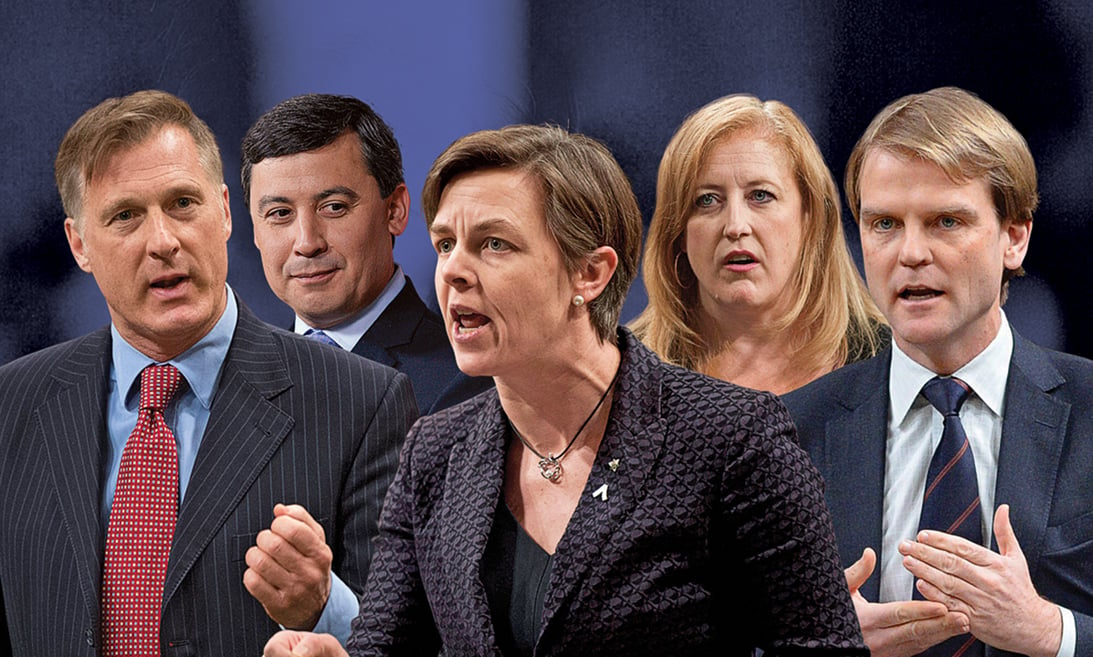Conservative leadership candidates who shouldn’t be named
Scott Gilmore on the contenders, the clones and the clowns in the Conservative leadership race
Share

In physics there is something called the “observer effect.” This states that since you can’t see something without some form of light hitting it, and because the light inevitably changes the object being viewed, it is therefore impossible to observe anything without altering it.
This is a paradox that also applies to journalism. When the media reports on a subject, the subject is inevitably transformed in the process, especially when that subject is a political candidate. It is impossible to simply “observe and report.” Even the most gentle scrutiny changes the campaign being reported on.
This was most spectacularly demonstrated during the recent U.S. election. There are many reasons why Donald Trump was elected president, but one of the biggest is that journalists covered him far more than any other candidate. The act of observing his campaign ensured that it came to everyone’s attention and boosted him to the front of the polls.
This presents a dilemma for the media—or at least it should. When a political candidate does something outrageous, it would seem to make perfect sense to cover it. But when you write about that politician’s vacuous stupidity, you’re also advertising their political message. This means that no matter how poisonous or dishonest that message is, you’re helping it find new adherents. And, worse, you aren’t writing about the other candidates, who are sincerely campaigning on ideas.
I’ve been wrestling with the dilemma of the “observer effect” a lot lately as I’ve followed the leadership race for the Conservative Party of Canada. So far, the race has attracted 14 candidates who fall into three groups: the contenders, the clones and the clowns. The contenders aspire to lead all Canadians with our conflicting needs and wants. These candidates are explaining proposals, not mouthing slogans. And they are trying, with varying degrees of success, to address complicated issues with equally complicated ideas. It includes Michael Chong, Maxime Bernier, Lisa Raitt and maybe one or two more.
The clones make up the bulk of the slate, and they aspire simply to run. Their ideas are mostly indistinguishable, undistinguished and uninspired. They want to run laps simply to generate some name recognition that might make them “cabinet contenders” when the party once again forms a government.
The last group is the clowns. There are two of them. They aspire to win, which is not the same as aspiring to lead the country. Their platform is a dog’s breakfast of provocations, controversies, wedge issues and manufactured anger. The clowns have calculated that the path to leadership runs through the newsrooms of the nation, and the best way to get there is to mug for the cameras with one outrage or pratfall after another.
One of the clowns has succeeded in getting more press than most of the other candidates combined by flogging a series of intellectually dishonest ideas meant to leech off Canadian insecurities regarding crime and refugees. She disingenuously announces a polarizing proposal meant to solve a “crisis” that doesn’t exist, the media and other politicians dutifully point out she’s a fool, and in the process she dominates an entire news cycle and increases her name recognition.
The other clown hasn’t been as successful. But he tried hard to find some notoriety this week by joining a rally in Edmonton organized by one of Canada’s most discredited political advocates. The candidate was in the midst of a speech attacking Alberta’s Premier Rachel Notley when the crowd began to chant, “Lock her up!” He laughed and conducted the mob with his hand. Now, this is where I made a mistake. I knew this man before he was a politician. We worked together once, years ago in Kabul, and I didn’t just respect him, I looked up to him. In Afghanistan, he fought the good fight, championing democracy and the rule of law. And now here he was, visibly delighting in the idea that a woman should be jailed because the mob didn’t like her politics.
It was a shameful display, and I couldn’t help but broadcast my dismay. I mounted my bully pulpit and thundered my self-righteous disapproval. CBC interviewed the candidate, the newspapers weighed in, and my old friend and colleague Evan Solomon invited me on to his radio show to debate the issue. He and I went back and forth, we argued about the candidate and the third-rate impresario who organized the rally. I sputtered my indignation and walked out feeling smugly on the side of the angels.
But the observer effect means it isn’t that simple. When I chose to turn my spotlight on the candidate, the result was that I and other members of the media spent more time talking about him than we had all year. I can guarantee he won many more supporters in the process. He profited from my disdain.
So what should I have done? Should we focus only on the contenders and ignore the clowns, refusing to give them attention but in the process implicitly condoning their demagoguery? Or should we shine a klieg light on their shameless campaigns and inevitably boost their popularity by doing so? I don’t know. But there is one thing I can promise: I may continue to write about the clowns, but until they have something original and worthwhile to say, I will never mention their names. And perhaps you shouldn’t either.
Disclosure: Scott Gilmore is married to Catherine McKenna, the minister of the environment